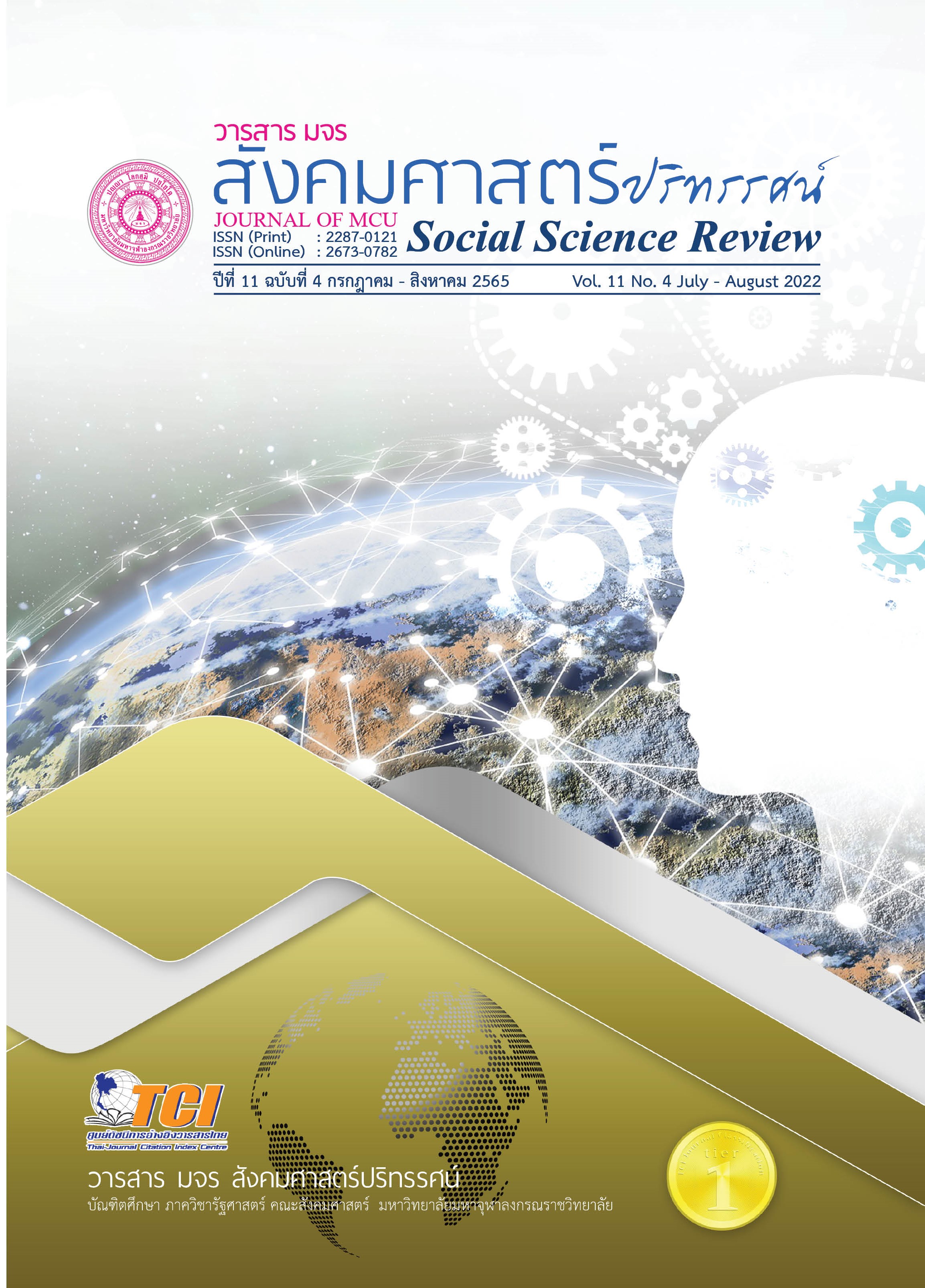การพัฒนาการเสริมสร้างความปรองดองสมานฉันท์ด้วยการขับเคลื่อน โครงการหมู่บ้านรักษาศีล 5 จังหวัดสมุทรสงคราม
คำสำคัญ:
การพัฒนา, ความปรองดองสมานฉันท์, โครงการหมู่บ้านรักษาศีล 5บทคัดย่อ
บทความวิจัยนี้มีวัตถุประสงค์เพื่อศึกษาสภาพทั่วไป ศึกษากระบวนการ และนำเสนอการพัฒนาการเสริมสร้างความปรองดองสมานฉันท์ด้วยการขับเคลื่อนโครงการหมู่บ้านรักษาศีล 5 ใช้ระเบียบวิธีการวิจัยเชิงคุณภาพ ด้วยการสัมภาษณ์เชิงลึก จากพระสังฆาธิการ บุคลากรสำนักงานพระพุทธศาสนาจังหวัด ผู้นำชุมชน ประชาชนและนักวิชาการทางด้านการจัดการเชิงพุทธ ด้วยการเลือกแบบเจาะจง จำนวน 25 รูปหรือคน ได้ใช้แบบสัมภาษณ์แบบมีโครงสร้าง และการสนทนากลุ่มเฉพาะผู้ทรงคุณวุฒิ จำนวน 10 รูปหรือคน โดยวิเคราะห์ข้อมูลด้วยเทคนิคการวิเคราะห์เนื้อหาประกอบบริบท
ผลการวิจัยพบว่า 1. โครงการหมู่บ้านรักษาศีล 5 มีการดำเนินการร่วมกันกับภาคีเครือข่าย เน้นสร้างความเข้าใจแก่ภาครัฐ เอกชน และประชาชน ขับเคลื่อนโครงการร่วมกับหน่วยอบรมประชาชนประจำตำบล (อปต.) แต่ยังขาดการประสานในการปฏิบัติงานแบบบูรณาการ ขาดการบันทึกเก็บข้อมูลอย่างเป็นระบบ 2. กระบวนการในการเสริมสร้างความปรองดองสมานฉันท์ พบว่า มีการประชุมวางแผนการขับเคลื่อน โดยใช้หลัก PDCA มีการนำผลสัมฤทธิ์ในการดำเนินงานมาปรับปรุงแก้ไขให้สอดคล้องกับนโยบายคณะสงฆ์ที่ได้จัดทำร่วมกับหน่วยงานของรัฐ 3. การพัฒนาการเสริมสร้างความปรองดองสมานฉันท์ ด้านทานประกอบด้วย การสงเคราะห์ประชาชนด้วยปัจจัยและสิ่งของต่างๆ เพื่อช่วยเหลือชาวบ้านให้อยู่ดี กินดี เน้นการสงเคราะห์ประชาชนที่ประสบทุกข์ หรือมีความเป็นอยู่ที่ยากลำบาก ให้ความรู้แก่ประชาชนเกี่ยวกับศีล 5 พระสงฆ์ร่วมกับผู้นำหมู่บ้าน จัดทำโครงการกิจกรรมให้คนในชุมชนมีความรู้ความเข้าใจหลักพุทธธรรมให้มากขึ้น
เอกสารอ้างอิง
พระมหาหรรษา ธมฺมหาโส (นิธิบุญยากร). (2547). รูปแบบการจัดการความขัดแย้งโดยพุทธสันติวิธี : ศึกษาวิเคราะห์กรณีลุ่มน้ำแม่ตาช้าง จ.เชียงใหม่ (วิทยานิพนธ์พุทธศาสตรดุษฎีบัณฑิต). พระนครศรีอยุธยา: มหาวิทยาลัยมหาจุฬาลงกรณราชวิทยาลัย.
พระมหาอภิวัชร์ อภิวชฺชโร. (2564).คุณภาพชีวิตของประชาชนตามแนวโครงการหมู่บ้านรักษาศีล 5 ของชุมชนหนองจอก อำเภอท่ายาง จังหวัดเพชรบุรี. วารสารสหวิทยาการนวัตกรรมปริทรรศน์, 4(2), 31-41.
พระราชวัลภาจารย์ (ดาวเรือง อาจารคุโณ). (2563). รูปแบบการสงเคราะห์ประชาชนตามโครงการหมู่บ้านรักษาศีล 5 ของคณะสงฆ์จังหวัดราชบุรี (วิทยานิพนธ์พุทธศาสตรดุษฎีบัณฑิต สาขาวิชาการจัดการเชิงพุทธ). พระนครศรีอยุธยา: มหาวิทยาลัยมหาจุฬาลงกรณราชวิทยาลัย.
พระวิมาน คมฺภีรปญฺโญ (ตรีกมล). (2555). การศึกษาวิเคราะห์ศีล 5 ในฐานะเป็นรากฐานของสันติภาพ (วิทยานิพนธ์พุทธศาสตรดุษฎีบัณฑิต สาขาวิชาพระพุทธศาสนา), พระนครศรีอยุธยา: มหาวิทยาลัยมหาจุฬาลงกรณราชวิทยาลัย.
พระอนุวัฒน์ อภิวฑฺฒโน. (2564). การพัฒนาคุณภาพชีวิตตามโครงการหมู่บ้านรักษาศีล 5 ของชุมชนวัดหนองไม้เหลือง อำเภอเมือง จังหวัดเพชรบุรี. วารสารพุทธนวัตกรรมและการจัดการ, 4(1), 37-46.
สถาบันพระปกเกล้า. (2555). การสร้างความปรองดองแห่งชาติ (รายงานการวิจัย). กรุงเทพฯ: คณะกรรมาธิการวิสามัญพิจารณาศึกษาแนวทางการสร้างความปรองดองแห่งชาติ สภาผู้แทนราษฎร.
ดาวน์โหลด
เผยแพร่แล้ว
รูปแบบการอ้างอิง
ฉบับ
ประเภทบทความ
สัญญาอนุญาต
ลิขสิทธิ์ (c) 2022 วารสาร มจร สังคมศาสตร์ปริทรรศน์

อนุญาตภายใต้เงื่อนไข Creative Commons Attribution-NonCommercial-NoDerivatives 4.0 International License.
เพื่อให้เป็นไปตามกฎหมายลิขสิทธิ์ ผู้นิพนธ์ทุกท่านต้องลงลายมือชื่อในแบบฟอร์มใบมอบลิขสิทธิ์บทความให้แก่วารสารฯ พร้อมกับบทความต้นฉบับที่ได้แก้ไขครั้งสุดท้าย นอกจากนี้ ผู้นิพนธ์ทุกท่านต้องยืนยันว่าบทความต้นฉบับที่ส่งมาตีพิมพ์นั้น ได้ส่งมาตีพิมพ์เฉพาะในวารสาร มจร สังคมศาสตร์ปริทรรศน์ เพียงแห่งเดียวเท่านั้น หากมีการใช้ภาพหรือตารางหรือเนื้อหาอื่นๆ ของผู้นิพนธ์อื่นที่ปรากฏในสิ่งตีพิมพ์อื่นมาแล้ว ผู้นิพนธ์ต้องขออนุญาตเจ้าของลิขสิทธิ์ก่อน พร้อมทั้งแสดงหนังสือที่ได้รับการยินยอมต่อบรรณาธิการ ก่อนที่บทความจะได้รับการตีพิมพ์ หากไม่เป็นไปตามข้อกำหนดเบื้องต้น ทางวารสารจะถอดบทความของท่านออกโดยไม่มีข้อยกเว้นใดๆ ทั้งสิ้น





